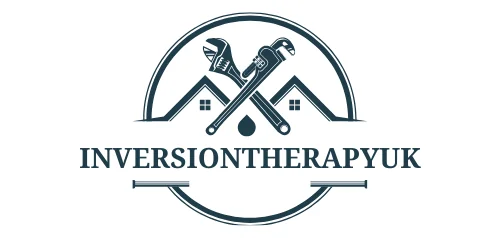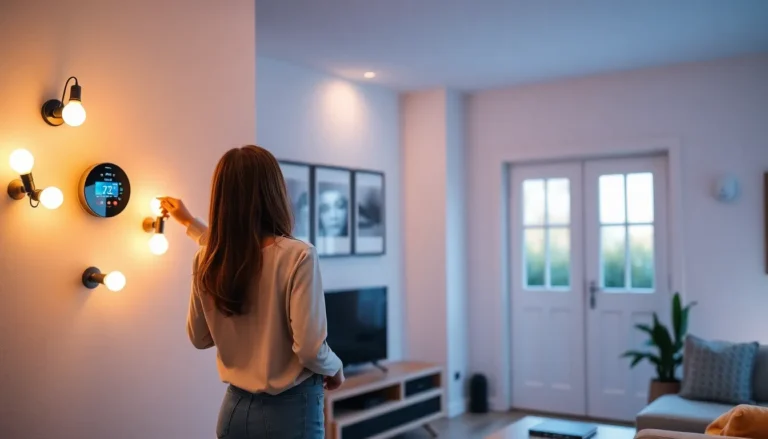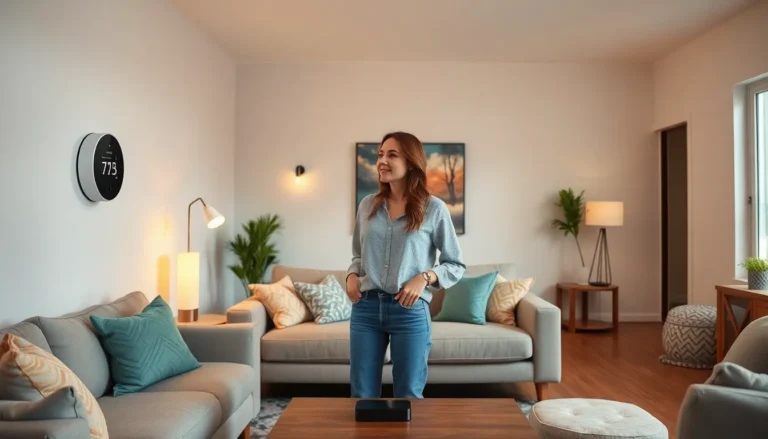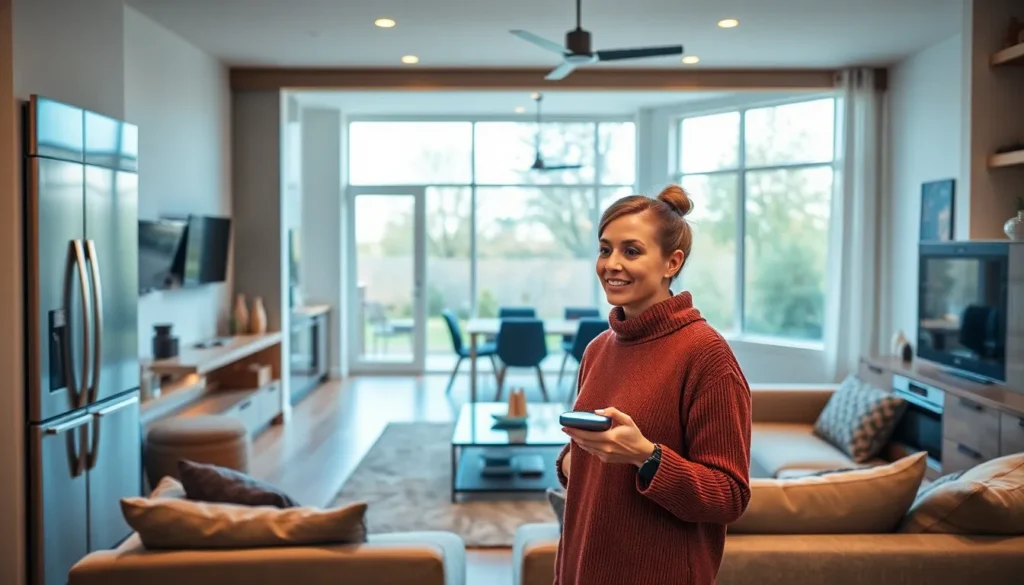Table of Contents
ToggleImagine waking up to the gentle hum of your coffee maker brewing your favorite blend, while the blinds automatically rise to greet the morning sun. Welcome to the world of home automation, where everyday tasks become effortless and your home transforms into a smart sanctuary. With a sprinkle of technology and a dash of convenience, home automation companies are revolutionizing the way people live—one smart device at a time.
These innovative companies are like the fairy godmothers of modern living, turning mundane chores into magical experiences. From controlling your thermostat with a simple voice command to ensuring your home is secure while you’re away, automation is more than just a trend; it’s a lifestyle upgrade. So, if you’re ready to trade in your old-fashioned home for a smarter, more efficient one, it’s time to dive into the exciting realm of home automation.
Overview of Home Automation Companies
Home automation companies specialize in transforming residential environments into smart homes. These businesses develop and integrate technologies that enhance convenience and connectivity for homeowners. Customers can find solutions such as smart lighting, climate control systems, and security devices. Industry leaders include companies like Nest, which offers innovative thermostat technology, and Ring, known for its advanced security systems.
Companies focus on usability, with many products featuring user-friendly interfaces. Customers enjoy the ability to control devices remotely via smartphones or voice commands. Demand for automation systems continues to rise, with a projected growth rate of 27 percent between 2023 and 2030.
Customization is another critical aspect. Many home automation companies provide tailored solutions, allowing clients to choose systems according to their specific needs. Popular features often include energy monitoring, smart access controls, and integrated security alerts.
Several companies also prioritize sustainability by offering energy-efficient products. Eco-friendly solutions help homeowners reduce utility bills while minimizing their environmental footprint. Partnerships with technology firms enhance product compatibility, creating a seamless ecosystem of smart devices.
In evaluating the best home automation company, aspects like customer service, product reliability, and installation support are vital. These factors significantly impact user experience and satisfaction. Industry certifications, such as those from CEDIA, further indicate a company’s commitment to quality and innovation.
Key Features to Look For

When selecting a home automation company, several key features enhance user experience and satisfaction. These aspects include device compatibility and user interface.
Device Compatibility
Device compatibility plays a critical role in home automation. The system should integrate seamlessly with various smart devices, whether from different brands or ecosystems. Popular brands like Nest and Ring support compatibility with several other devices, enabling users to control lights, thermostats, and security cameras from a single platform. Compatibility with protocols such as Zigbee, Z-Wave, and Wi-Fi further enhances connectivity options for homeowners. Ensure the selected automation system easily accommodates existing devices, providing flexibility for future upgrades. A well-rounded system promotes effortless communication between devices, creating a cohesive smart home environment.
User Interface
User interface significantly impacts the usability of home automation systems. An intuitive and user-friendly interface simplifies device control, making it easy for individuals of all tech skill levels to navigate. Look for features such as customizable dashboards, voice command capabilities, and mobile app accessibility. These elements make managing home settings efficient and straightforward. Responsiveness is also crucial; a quick-loading interface ensures users access their systems without delays. Clear instructions and prompt notifications contribute to a positive experience, allowing homeowners to enjoy the full benefits of automation technology.
Leading Home Automation Companies Reviewed
This section reviews prominent home automation companies, highlighting their strengths and weaknesses.
Company A: Strengths and Weaknesses
Company A excels in user-friendly products that enhance convenience. Its smart lighting solutions integrate seamlessly with various systems, providing flexibility for homeowners. Reliability stands out as a key feature, offering consistent performance across devices. However, limited compatibility with third-party products can frustrate users seeking broader integration. Customer service receives mixed reviews, with wait times for support causing some dissatisfaction. Despite these weaknesses, Company A remains a strong contender in the home automation market.
Company B: Strengths and Weaknesses
Company B is known for its robust security features. Advanced monitoring systems and alerts help protect homes effectively. The installation process is straightforward, allowing homeowners to set up systems with minimal hassle. An extensive product range supports various automation needs. On the downside, pricing may be higher compared to competitors. Some users report a steep learning curve for the mobile app, which can hinder initial setup. Overall, Company B combines reliability with comprehensive security solutions.
Company C: Strengths and Weaknesses
Company C offers exceptional customization options tailored to user needs. Flexible solutions enable homeowners to design smart systems that align with their lifestyle. Energy-efficient products contribute to lower utility bills, fostering sustainability. The intuitive user interface enhances overall ease of use. Nevertheless, the warranty coverage may not meet expectations for all devices. Users may also encounter issues with app updates, affecting system performance. Despite minor drawbacks, Company C stands out for its commitment to innovative automation solutions.
Cost Comparison
Home automation costs vary significantly based on device selection and service packages. Basic systems typically range from $200 to $1,000, which includes essential devices such as smart speakers or lights. Advanced setups may exceed $5,000, incorporating comprehensive security systems and multiple smart appliances.
Installation expenses can also differ greatly. Professional installations average between $100 and $200 per hour, depending on complexity and location. DIY installation can reduce costs but may not provide the same level of expertise.
Monthly subscription fees for services can add up. Some companies charge $10 to $30 per month for access to advanced features or cloud storage. Understanding these recurring expenses helps homeowners plan their budgets accurately.
Potential savings on utility bills further enhance cost-effectiveness. Energy-efficient devices could lower monthly energy costs by 10 to 30 percent, depending on usage. These savings contribute toward offsetting initial investments over time.
Comparing products from different providers proves essential for identifying the best value. Company A may offer lower upfront costs but higher ongoing fees, while Company B has a higher initial price with minimal subscription expenses. Evaluating these factors leads to informed decisions based on personal needs and financial goals.
Consumer reviews often provide insights into overall satisfaction and hidden costs. Researching user experiences helps clarify the long-term value of products in connection to their prices. Prioritizing reliable, user-friendly systems translates into smarter investments for efficient homes.
Future Trends in Home Automation
Emphasis on artificial intelligence is reshaping home automation, allowing systems to learn user habits and preferences. Voice recognition technology enhances user interaction with smart devices, making voice commands a standard part of everyday life. Integration with smart home ecosystems is gaining traction, promoting seamless communication among devices from different manufacturers.
Cybersecurity will play a pivotal role in future developments, as homeowners prioritize the safety of their connected devices. Biometric access controls are emerging, providing additional layers of security through features like facial recognition and fingerprint scanning. These advancements aim to protect personal data while enhancing convenience.
Sustainability trends are driving the industry, with smart devices optimizing energy use and reducing waste. Innovative energy management systems will help users monitor consumption, achieving savings of 10 to 30 percent on utility bills. The demand for eco-friendly products is increasing, pushing manufacturers to develop energy-efficient solutions.
Personalization will continue to shape consumer preferences, leading to customizable home automation systems. Users appreciate tailored solutions that address specific needs, such as energy monitoring and adaptive lighting. As customers seek unique experiences, companies that offer extensive customization options will stand out.
Lastly, subscription-based services are set to grow in popularity, allowing users to access premium features and updates. Monthly fees ranging from $10 to $30 offer enhanced functionalities, contributing to the ongoing evolution of home automation. The shift towards service-oriented models reflects a growing desire for ongoing support and innovation in smart home technology.
Home automation is more than just a technological upgrade; it’s a transformative approach to modern living. As homeowners increasingly seek convenience and efficiency, the demand for smart home solutions continues to rise. Companies like Nest and Ring lead the way, offering innovative products that enhance security and energy management.
With customization at the forefront, these companies cater to individual needs, ensuring a tailored experience. As the industry evolves, staying informed about trends and product offerings will empower homeowners to make the best choices. Investing in reliable and user-friendly systems not only enhances daily life but also contributes to long-term savings and sustainability. Embracing home automation is a step toward a smarter future.







